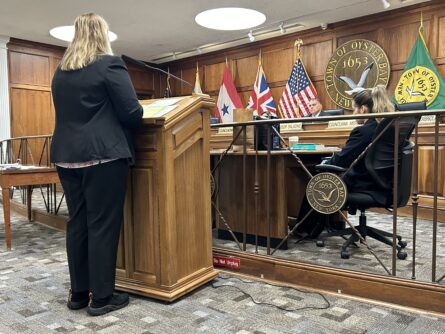“You can put lipstick on a pig, but it’s still a pig. And in this case, we can call that pig ‘BESS’IE.”
This sentiment, shared by local Robert Mazella, echoes the consistently expressed discontent of Oyster Bay residents over the potential conclusion of the Battery Energy Storage System, or BESS, moratorium.
Residents of Oyster Bay flocked to the Oct. 15 Town board meeting to ask that the members approve the proposed local law, which would extend the moratorium period for another six months.
Battery Energy Storage Systems have sprouted across the state in recent years, prompting towns on Long Island to consider installing them.
The facilities tout rechargeable batteries that can store and disperse energy, balancing an electric grid and providing backup power when needed.
However, public concerns have grown after several problematic, even dangerous, malfunctions of the lithium-ion batteries used in many of these systems. The town board responded by considering a moratorium to pause approving more systems on Long Island.
The most recent moratorium was approved on April 9 and expired the day of the meeting.
Town attorney Elizabeth Faughnan presented the newest extension proposal. While the general aims of the proposal remain the same, Faughnan mentioned that some of the language was “tweaked” to make the aim of the proposal more clear to members of the public.
“In consultation with the Department of Environmental Resources and the Office of the Town Attorney, we have made several proposed changes, which all should have been received by your office late last week,” Faughnan said to the board.
These changes are available to the public and can be accessed by visiting https://oysterbaytown.com/proposed-local-laws/
The moratorium, as clarified by both Town Supervisor Joseph Saladino and Council Member Lou Imbroto, does not refer to a specific case presented to the board. It is a broad moratorium against all Battery Energy Storage System proposals.
However, Jupiter Power Company’s proposed 275-megawatt lithium battery storage facility in Glenwood Landing, as well as Propel NY Energy’s proposed large-scale electric transmission lines, have been consistent sore points for residents, who bring up the proposal at each moratorium hearing.
Doug Augenthaler was the first resident to address the board.
“My concern [with allowing the battery installation] is, what’s the rush? I’m not anti-green, but what is our hurry to do this?” Augenthaler asked.
Augenthaler suggested that waiting a few more years might allow for the development of better, more reliable batteries that the town could consider installing.
“If we wait, there’s going to be better battery technology that doesn’t have the same fire risk.” she said. “There’s no reason to do this right now”
Roslyn Harbor resident Joan Matthews also requested the extension of the moratorium. She emphasized the environmental risks posed by lithium-ion batteries. “I’m not against green energy, but not at the detriment of our wildlife, domestic animals, or water supply.”
Matthews argued the health and safety proposed by the batteries do not counteract or nullify the contamination of waterways across from the Jupiter and Propel sites, as well as the aquifers from which residents receive drinking water.
“There is also a lot of flooding in the area,” she said. “The runoff from the streets of fires we have to fight go right into our waterways, and [the battery-infused water] would be contaminated.”
Fires from the volatile nature of lithium-ion batteries were addressed again and again by members of the public.
Maria Slovodskoy, a lifelong resident of Glen Head, wondered about the lack of an evacuation plan should disaster come to fruition.
“This is a very densely populated area,” she said. “If there is a fire, I don’t know what it would be like to have to shelter over 300 children [at Glenwood Landing School] in place for several days. How would that be handled?”
“Anyone who knows the area… it’s such a bottleneck,” Slovodskoy said. “There’s no evacuation route. As soon as there’s any [kind of obstruction], there’s traffic. You sometimes have to stand at a red light three or four times before you can make it across Northern Boulevard.”
Robert Mazella seconded Slovodskoy’s fire and evacuation concerns. Mazella attended the meeting as a volunteer representative of the Glen Head Glenwood Landing Civic Council.
“Over the course of the last few town meetings, we’ve heard many people speak about the hazards associated with lithium battery fires. We also keep hearing about lithium battery fires in the news.”
“As I mentioned at the last meeting, a member of the energy safety response group was quoted as saying ‘let it burn’ when asked what do you do when one of these facilities goes on fire,” he added. “I believe we deserve a better response than ‘let it burn.’”
Resident Beth Costello asked, “Why do the people who pay taxes in this community have less of a say than the battery companies that want to come in here and build?”
Chris Panzeca was the last member of the public to speak. “We know we need a cleaner way of doing things that will be reliable and responsible. Not one that is intermittent or questionable.”
“These projects impact human lives, our community, and our environmental integrity,” Panzeca continued. “We do not want to be mitigated after the fact.”































